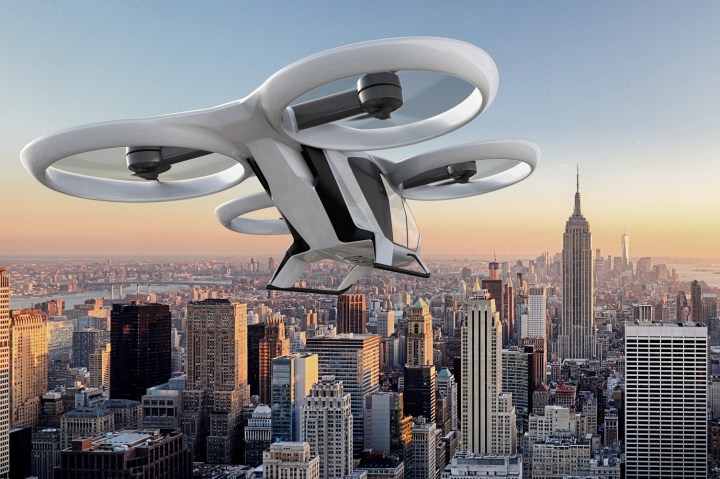
The CityAirbus quadcopter is similar to the Pop.Up unveiled earlier this year at the Geneva Auto Show, but it’s much simpler in design because it ditches the three-module configuration. It instead takes the form of a small, futuristic-looking helicopter developed exclusively for short-range air travel. It’s capable of taking off and landing vertically, whisking up to four passengers (including the pilot) right over traffic jams to important public destinations like trains stations and airports. It’s one way to solve the problem of urban mobility.
Power comes from an electric drivetrain made up of eight separate motors that draw electricity from four 140-kilowatt battery packs to power the eight propellers driving the CityBus. It has a top speed of about 75 mph, and its batteries store enough electricity for roughly 15 minutes of operation. That’s not much, even for a vehicle designed for short intracity trips, so Airbus will need to develop a clever way to recharge the batteries in record time.
The CityAirbus is on track to make its maiden flight in late 2018. Early prototypes will be remote-controlled for safety reasons until Airbus engineers gather enough data on the powertrain to ensure it works as planned in a wide variety of conditions. Intrepid test pilots will hop on board later in the testing phase to complete the process.
If everything goes according to plan (and nothing ends in an expensive ball of fire), company officials predict the first examples of the CityAirbus will begin crisscrossing the skies in 2023. They will be initially be controlled by professional pilots, a solution which will facilitate the certification process and help the general public warm up to the idea of traveling in an electric pod. Airbus plans on making the CityAirbus entirely autonomous later in the production run.
The lack of regulations applicable to a mode of transportation which blurs the line between a drone and a personal aircraft could turn our skies into the Wild West. The company realistically notes urban air traffic management will need to be upgraded before machines like the CityAirbus are deployed en masse across the nation. Don’t be surprised if you find a control tower in the Whole Foods parking lot in the future.



